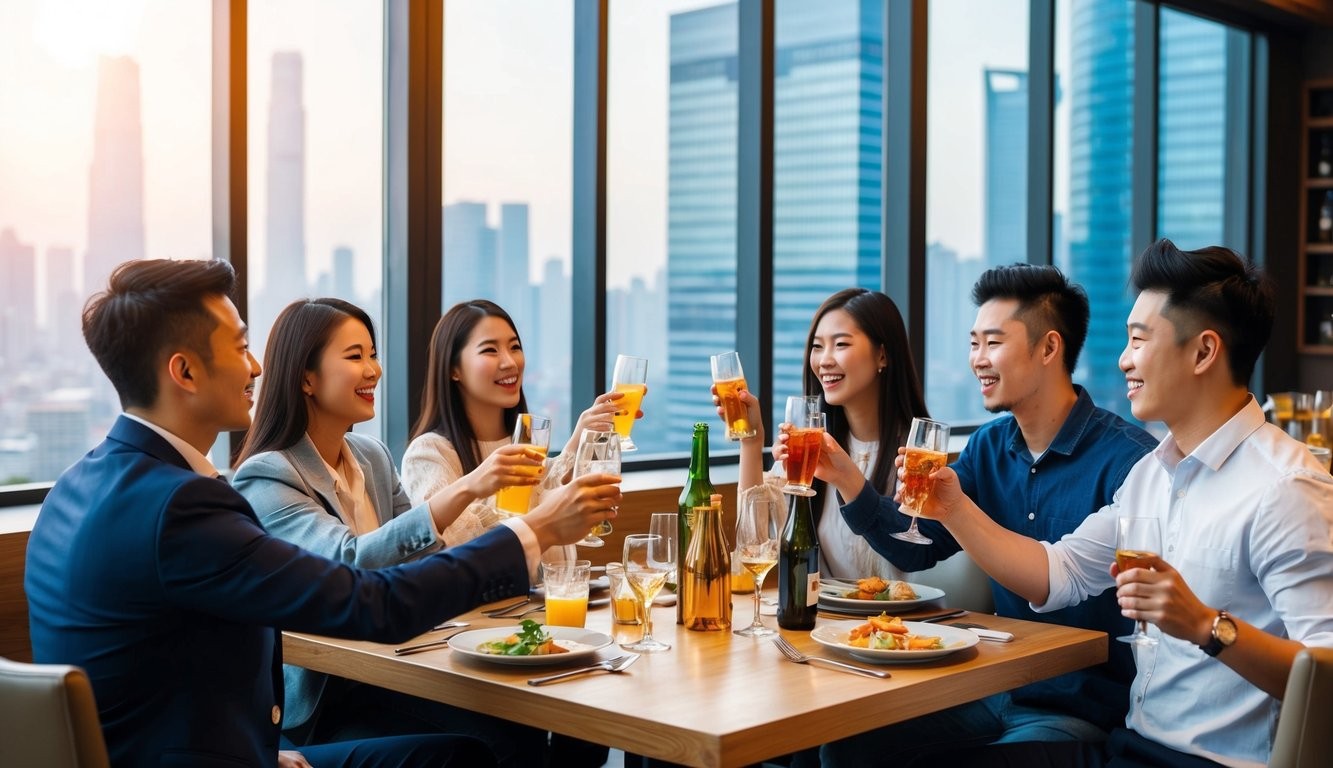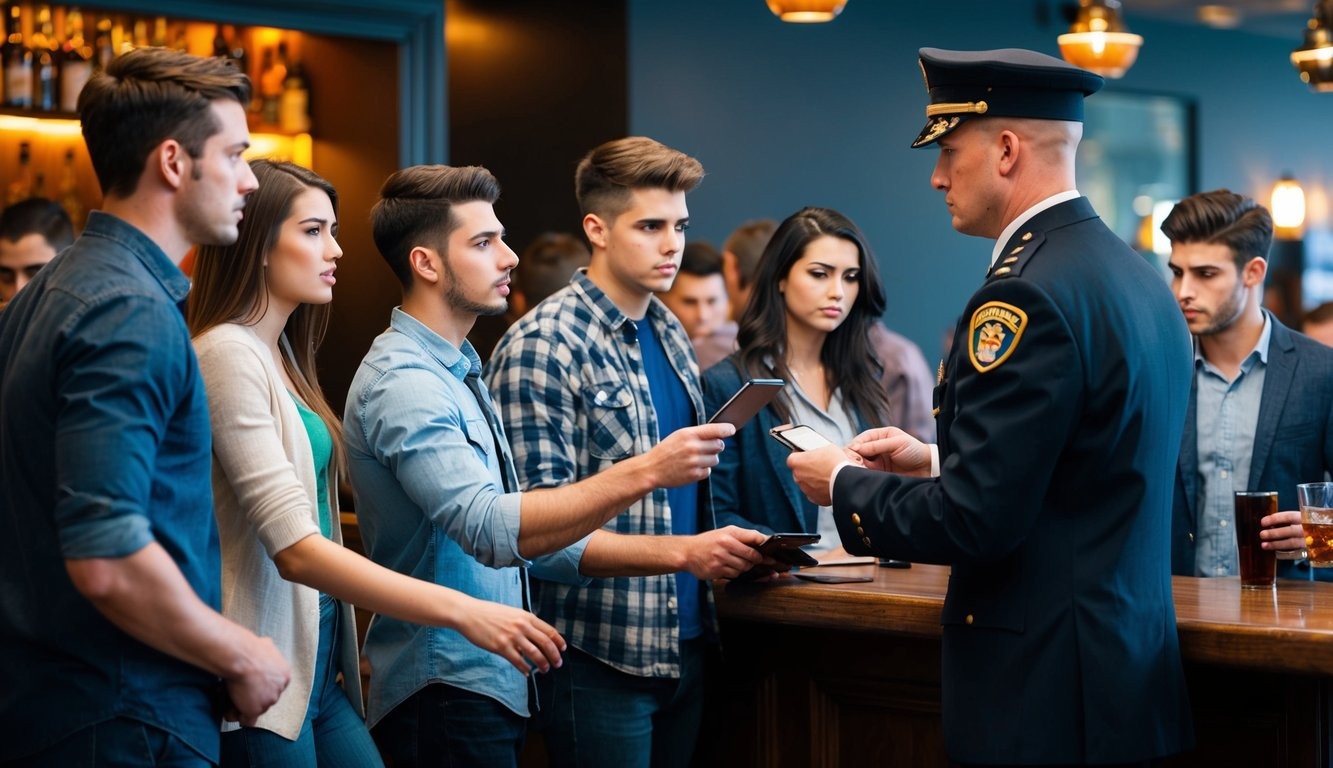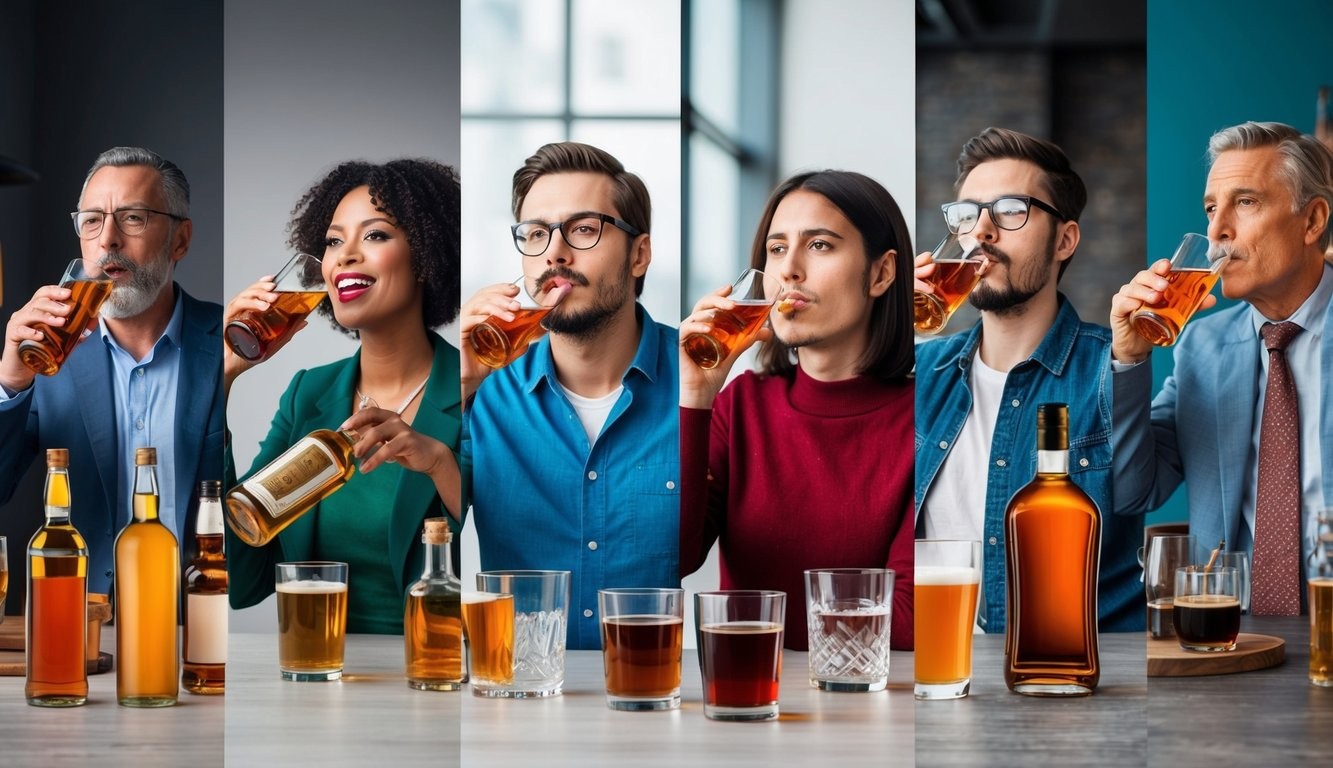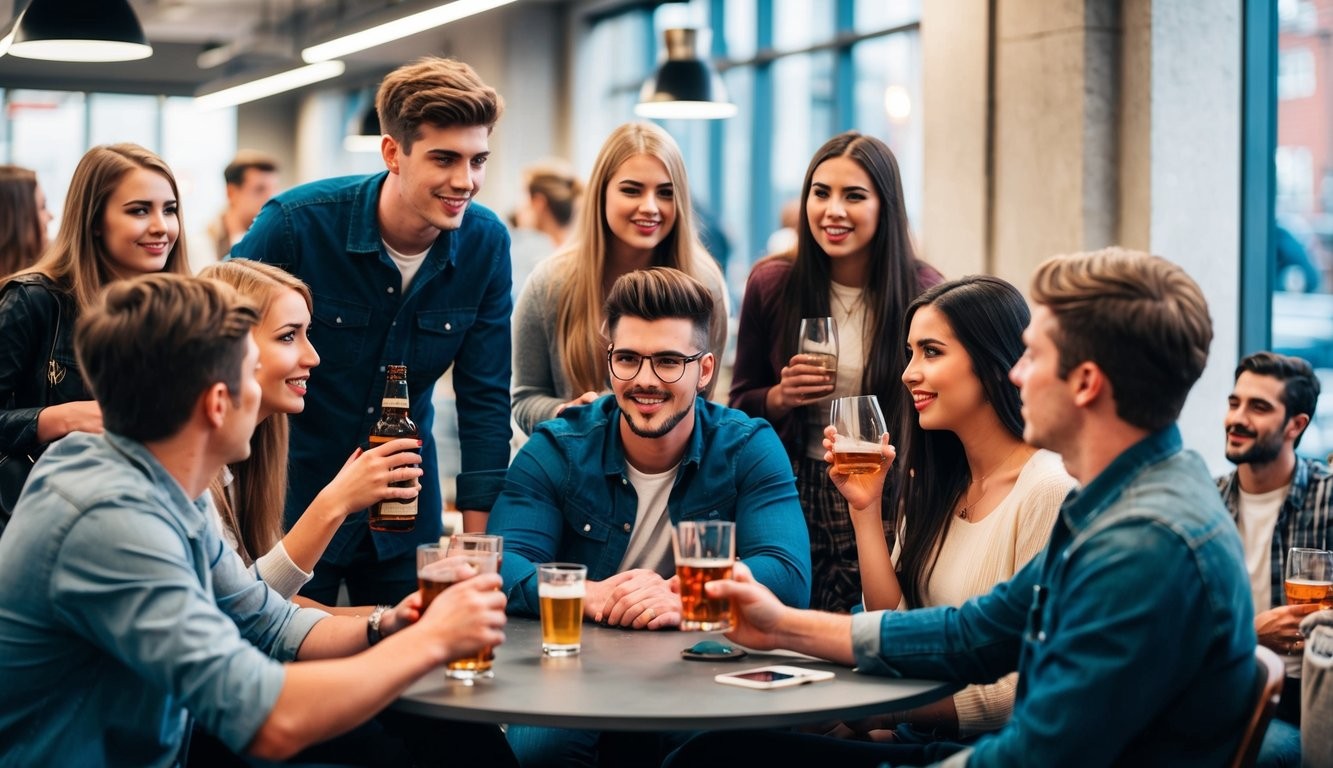Navigating the cultural nuances of a new country can be both exciting and challenging, especially when it comes to local customs. When visiting Vietnam, understanding the local attitude toward drinking and driving is crucial for a safe and respectful experience. At SIXT.VN, we aim to provide you with the essential knowledge to make your travel smooth and enjoyable. Discover Vietnam responsibly with insights into local drinking culture and transportation options.
1. What are the Laws Regarding Drinking and Driving in Vietnam?
Vietnam enforces strict laws against driving under the influence. The legal blood alcohol concentration (BAC) limit is 0.0%. This means any detectable amount of alcohol in your system while driving is illegal. Penalties for violating these laws can be severe, including hefty fines, license suspension, and even imprisonment, depending on the level of intoxication and any resulting accidents. According to the National Traffic Safety Committee of Vietnam, these stringent measures aim to reduce traffic accidents and ensure public safety.
1.1. What are the Penalties for Violating DUI Laws in Vietnam?
Penalties for driving under the influence (DUI) in Vietnam vary based on the severity of the offense. Fines can range from several million to tens of millions of Vietnamese Dong (VND). For instance, a first-time offender with a low BAC might face a fine of VND 2-3 million, while repeat offenders or those with high BAC levels could be fined VND 18-40 million. License suspension is also a common penalty, ranging from a few months to several years. In cases where DUI results in injury or death, offenders can face imprisonment ranging from 3 to 15 years. These penalties underscore the seriousness with which Vietnam treats drunk driving.
1.2. How is BAC Measured in Vietnam?
In Vietnam, blood alcohol concentration (BAC) is primarily measured through breathalyzer tests conducted by traffic police at roadside checkpoints. These devices provide an immediate reading of the alcohol content in a driver’s breath. In some instances, particularly following an accident, a blood test may be required for a more accurate BAC reading. Refusal to take a breathalyzer or blood test can result in immediate license suspension and hefty fines. The accuracy and reliability of testing methods are continuously improving to ensure fair enforcement of DUI laws.
1.3. Are There Exceptions to Vietnam’s DUI Laws?
No, Vietnam’s DUI laws do not have exceptions. The legal blood alcohol concentration (BAC) limit is 0.0%, meaning any detectable amount of alcohol in your system while driving is illegal. This strict enforcement applies to all drivers regardless of vehicle type or personal circumstances. The government’s zero-tolerance policy aims to eliminate drunk driving and reduce road accidents, ensuring the safety of all road users.
 Traffic police conducting a breathalyzer test at a roadside checkpoint in Vietnam demonstrating law enforcement's strict adherence to DUI regulations
Traffic police conducting a breathalyzer test at a roadside checkpoint in Vietnam demonstrating law enforcement's strict adherence to DUI regulations
2. What is the Local Attitude Towards Drinking in Vietnam?
Drinking is a significant part of Vietnamese social culture, deeply rooted in traditions and customs. While laws are strict, the local attitude towards drinking is generally permissive, especially in social settings. It’s common to see people drinking beer or rice wine at restaurants, street food stalls, and social gatherings. However, attitudes are changing, with growing awareness of the dangers of excessive alcohol consumption and drunk driving.
2.1. How is Drinking Integrated into Vietnamese Social Culture?
Drinking is deeply integrated into Vietnamese social culture, playing a central role in celebrations, business dealings, and everyday socializing. At gatherings, sharing drinks strengthens bonds and shows respect. Traditional rice wine, or “rượu,” is often homemade and served during family events and festivals, symbolizing unity and hospitality. In business settings, drinking together helps build rapport and seal deals. While Vietnamese people enjoy alcohol, there is a growing awareness of responsible consumption to maintain health and social harmony.
2.2. Are There Cultural Norms Surrounding Alcohol Consumption in Vietnam?
Yes, several cultural norms surround alcohol consumption in Vietnam. “Chúc mừng” (cheers) is commonly used before taking a sip, and toasting is a sign of respect and camaraderie. It’s customary to pour drinks for others and ensure everyone’s glass is full. Refusing a drink can sometimes be seen as impolite, but it’s acceptable to politely decline if you have a valid reason. Sharing food while drinking is also typical, helping to pace alcohol consumption and enhance the social experience. These norms highlight the communal aspect of drinking in Vietnamese culture.
2.3. How Do Vietnamese People View Drunk Driving?
While drinking is socially acceptable, Vietnamese people are becoming more aware of the dangers of drunk driving. The government’s strict enforcement of DUI laws has raised awareness and shifted public opinion. Many now view drunk driving as irresponsible and dangerous, leading to increased social disapproval. Campaigns promoting responsible drinking and alternative transportation options have further contributed to this change. Despite the cultural acceptance of drinking, there’s a growing understanding of the importance of separating alcohol consumption from driving to ensure road safety.
 A group of Vietnamese friends toasting with beer at a local restaurant, illustrating the importance of social drinking in Vietnamese culture, while highlighting the need for responsible consumption and awareness of DUI laws
A group of Vietnamese friends toasting with beer at a local restaurant, illustrating the importance of social drinking in Vietnamese culture, while highlighting the need for responsible consumption and awareness of DUI laws
3. How Strictly are DUI Laws Enforced in Vietnam?
The enforcement of DUI laws in Vietnam varies, with stricter measures in urban areas compared to rural regions. Major cities like Hanoi and Ho Chi Minh City have frequent checkpoints and increased police presence to deter drunk driving. However, enforcement can be less consistent in more remote areas. Despite these variations, the overall trend is towards stricter enforcement nationwide, driven by government initiatives to improve road safety.
3.1. Are DUI Checkpoints Common in Vietnam?
Yes, DUI checkpoints are becoming increasingly common in Vietnam, especially in major cities. These checkpoints are often set up during evenings and weekends, when alcohol consumption is higher. Traffic police use breathalyzers to test drivers’ blood alcohol concentration (BAC). The presence of these checkpoints serves as a visible deterrent and helps enforce the country’s strict DUI laws. According to the Ministry of Transport, these measures have contributed to a decrease in alcohol-related traffic accidents.
3.2. How Do Enforcement Practices Differ Between Urban and Rural Areas?
Enforcement practices for DUI laws in Vietnam differ significantly between urban and rural areas. In urban centers like Hanoi and Ho Chi Minh City, enforcement is stricter with frequent checkpoints, advanced testing equipment, and higher police visibility. Rural areas often have less consistent enforcement due to limited resources and infrastructure. Cultural norms may also play a role, with greater leniency in some rural communities where social drinking is deeply ingrained. However, efforts are underway to improve enforcement across all regions to ensure consistent application of DUI laws nationwide.
3.3. What Factors Influence the Effectiveness of DUI Law Enforcement in Vietnam?
Several factors influence the effectiveness of DUI law enforcement in Vietnam. Resource allocation is crucial, as sufficient funding and equipment are needed for regular checkpoints and accurate testing. Public awareness campaigns play a vital role in educating people about the dangers of drunk driving and the consequences of violating DUI laws. Training and capacity building for traffic police ensure they can effectively enforce the laws and handle offenders. Cultural attitudes also matter, as community support for enforcement efforts can significantly impact compliance. Stronger coordination between government agencies, law enforcement, and local communities is essential for enhancing the overall effectiveness of DUI law enforcement in Vietnam.
 A DUI checkpoint in Hanoi, showcasing the increased vigilance and enforcement efforts in urban areas to combat drunk driving and promote road safety
A DUI checkpoint in Hanoi, showcasing the increased vigilance and enforcement efforts in urban areas to combat drunk driving and promote road safety
4. How Can Tourists Navigate Drinking and Transportation Responsibly in Vietnam?
Tourists in Vietnam can navigate drinking and transportation responsibly by planning ahead and using alternative transport options. Always avoid driving after consuming alcohol. Instead, rely on taxis, ride-hailing services like Grab, or public transportation. When attending social events, designate a sober driver or arrange for a ride home. Be aware of local customs and drink responsibly, respecting the strict DUI laws. By taking these precautions, tourists can enjoy Vietnam’s vibrant social scene while ensuring their safety and compliance with the law.
4.1. What are Safe Transportation Options After Drinking in Vietnam?
After drinking in Vietnam, several safe transportation options are available. Taxis are readily accessible in urban areas and offer a reliable way to get around. Ride-hailing services like Grab provide convenient and affordable transportation through a mobile app. Motorbike taxis (xe ôm) are another option, but ensure the driver is sober and wears a helmet. Public transportation, such as buses, is also available, though it may be less convenient for late-night travel. Designating a sober driver among your group is a responsible choice. These options help ensure you can enjoy social drinking without risking a DUI. SIXT.VN offers reliable and safe transportation services, including airport transfers and private car rentals with drivers, ensuring you have a hassle-free experience.
4.2. How Can Tourists Respect Local Customs While Drinking Responsibly?
Tourists can respect local customs while drinking responsibly in Vietnam by understanding and following social etiquette. Participate in toasts and share drinks with others, but politely decline if you’ve had enough. Avoid excessive drinking, which can be seen as disrespectful. Share food while drinking to pace alcohol consumption. Be mindful of noise levels and behavior in public spaces. Remember that while social drinking is common, maintaining decorum is important. By showing respect for Vietnamese customs and traditions, tourists can enjoy the social aspects of drinking while staying responsible and considerate.
4.3. What Resources are Available for Tourists Regarding DUI Laws and Safe Transportation?
Tourists in Vietnam can access various resources regarding DUI laws and safe transportation. Tourist information centers provide brochures and guidance on local laws and customs. Websites and mobile apps offer transportation options and safety tips. Local hotels and guesthouses can offer advice on safe transportation services and responsible drinking. The National Traffic Safety Committee of Vietnam provides information on DUI laws and safety campaigns. By utilizing these resources, tourists can stay informed and make responsible choices regarding drinking and transportation during their visit. SIXT.VN offers comprehensive travel assistance, including information on local laws, transportation services, and responsible travel tips, ensuring you have a safe and informed experience.
 A tourist using the Grab app to book a ride in Ho Chi Minh City, demonstrating a safe and convenient alternative to driving after drinking, and promoting responsible tourism
A tourist using the Grab app to book a ride in Ho Chi Minh City, demonstrating a safe and convenient alternative to driving after drinking, and promoting responsible tourism
5. Are There Campaigns Promoting Responsible Drinking in Vietnam?
Yes, several campaigns are promoting responsible drinking in Vietnam, led by both government and non-governmental organizations. These campaigns aim to raise awareness about the dangers of alcohol abuse and drunk driving. They often involve public service announcements, educational programs, and community events. The National Traffic Safety Committee plays a key role in these initiatives, working to reduce alcohol-related accidents and promote safer driving habits.
5.1. What Role Does the Government Play in Promoting Responsible Drinking?
The Vietnamese government plays a significant role in promoting responsible drinking through various initiatives. It enforces strict DUI laws, conducts public awareness campaigns, and supports educational programs on alcohol abuse. The Ministry of Health implements policies aimed at reducing alcohol consumption and preventing alcohol-related harm. The National Traffic Safety Committee coordinates efforts to decrease drunk driving incidents. These governmental actions reflect a commitment to public health and safety by encouraging responsible drinking habits.
5.2. What Organizations are Involved in Alcohol Awareness Campaigns?
Several organizations are actively involved in alcohol awareness campaigns in Vietnam. The National Traffic Safety Committee leads many national campaigns focused on preventing drunk driving. The Ministry of Health supports initiatives aimed at reducing alcohol consumption and related health issues. Non-governmental organizations (NGOs) also play a crucial role, conducting community-based programs and educational campaigns. These organizations work collaboratively to promote responsible drinking and raise awareness about the dangers of alcohol abuse.
5.3. How Effective are These Campaigns in Changing Public Behavior?
The effectiveness of responsible drinking campaigns in Vietnam varies, but there is evidence of positive change. Increased awareness of DUI laws and the dangers of alcohol abuse has led to a gradual shift in public behavior. Studies show a decrease in alcohol-related traffic accidents in some areas, suggesting that these campaigns are having an impact. However, challenges remain, including deeply ingrained cultural norms and inconsistent enforcement of laws. Continued efforts and comprehensive strategies are needed to achieve sustained and widespread behavior change.
 A public service announcement promoting responsible drinking and discouraging drunk driving in Vietnam, emphasizing the importance of awareness campaigns in shaping public behavior
A public service announcement promoting responsible drinking and discouraging drunk driving in Vietnam, emphasizing the importance of awareness campaigns in shaping public behavior
6. What are the Potential Long-Term Consequences of DUI in Vietnam?
The long-term consequences of driving under the influence (DUI) in Vietnam can be severe and far-reaching. Beyond immediate penalties like fines and license suspension, a DUI conviction can result in a criminal record, affecting future employment opportunities and travel prospects. Repeat offenders may face imprisonment, leading to significant personal and professional disruption. DUI-related accidents can cause serious injuries or fatalities, resulting in emotional trauma for victims and their families. The social stigma associated with DUI can also damage personal relationships and community standing. These long-term consequences highlight the profound impact of drunk driving on individuals and society.
6.1. How Can a DUI Conviction Affect Future Employment Opportunities?
A DUI conviction can significantly impact future employment opportunities in Vietnam. Many employers conduct background checks, and a criminal record, including a DUI, can raise concerns about reliability and responsibility. Some professions, such as driving, transportation, and positions requiring a clean driving record, may be completely off-limits. Even in other fields, a DUI conviction can put candidates at a disadvantage compared to those with clean records. Demonstrating remorse, taking steps to address alcohol-related issues, and highlighting positive qualities can help mitigate the negative impact, but the stigma of a DUI conviction can linger for years.
6.2. Can a DUI Conviction Impact Travel to Other Countries?
Yes, a DUI conviction can impact travel to other countries. Some countries deny entry to individuals with a criminal record, including DUI convictions. Visa applications often require disclosure of past criminal offenses, and a DUI can lead to rejection. Even if entry is granted, travelers with a DUI record may face additional scrutiny at border crossings. Certain countries, such as Canada and the United States, have strict policies regarding DUI offenses. It’s essential to research the entry requirements of your destination and be prepared to provide documentation related to your DUI conviction.
6.3. What Support Systems are Available for Individuals Struggling with Alcohol Abuse in Vietnam?
Various support systems are available for individuals struggling with alcohol abuse in Vietnam. The Ministry of Health operates treatment centers and provides counseling services. Non-governmental organizations (NGOs) offer community-based support groups and rehabilitation programs. Mental health professionals can provide therapy and guidance. Alcoholics Anonymous (AA) has chapters in major cities, offering peer support and recovery strategies. Seeking help from these resources can provide individuals with the tools and support they need to overcome alcohol abuse and lead healthier lives.
 A tourist using the Grab app to book a ride in Ho Chi Minh City, demonstrating a safe and convenient alternative to driving after drinking, and promoting responsible tourism
A tourist using the Grab app to book a ride in Ho Chi Minh City, demonstrating a safe and convenient alternative to driving after drinking, and promoting responsible tourism
7. What are Some Common Misconceptions About DUI Laws in Vietnam?
Several common misconceptions exist regarding DUI laws in Vietnam. One misconception is that a small amount of alcohol is permissible while driving; however, the legal BAC limit is 0.0%, meaning any detectable amount is illegal. Another misconception is that only drivers of cars are subject to DUI laws; in fact, these laws apply to all vehicles, including motorcycles and bicycles. Some believe that DUI laws are only strictly enforced in urban areas, but enforcement is increasing nationwide. It’s essential to be aware of the actual laws to avoid violations and ensure safety.
7.1. Is it True That a Small Amount of Alcohol is Permissible While Driving in Vietnam?
No, it is not true that a small amount of alcohol is permissible while driving in Vietnam. The legal blood alcohol concentration (BAC) limit is 0.0%, meaning any detectable amount of alcohol in your system while driving is illegal. This strict zero-tolerance policy aims to eliminate drunk driving and reduce road accidents. Even a single drink can put you over the legal limit, so it’s essential to avoid alcohol entirely if you plan to drive.
7.2. Do DUI Laws Only Apply to Car Drivers, or Do They Include Motorcyclists?
DUI laws in Vietnam apply to all vehicle operators, including motorcyclists. The legal blood alcohol concentration (BAC) limit of 0.0% applies equally to drivers of cars, motorcycles, and other vehicles. Motorcyclists are particularly vulnerable in traffic accidents, making it even more crucial for them to avoid driving under the influence. Enforcement of DUI laws targets all vehicle types to ensure road safety for everyone.
7.3. Are DUI Laws Only Strictly Enforced in Major Cities?
While it’s true that DUI laws are often more visibly enforced in major cities like Hanoi and Ho Chi Minh City, enforcement efforts are increasing nationwide. The government is working to improve enforcement across all regions to ensure consistent application of DUI laws. Rural areas may have less frequent checkpoints, but DUI laws still apply, and offenders can face serious penalties. It’s essential to be aware of DUI laws regardless of location in Vietnam.
 A tourist using the Grab app to book a ride in Ho Chi Minh City, demonstrating a safe and convenient alternative to driving after drinking, and promoting responsible tourism
A tourist using the Grab app to book a ride in Ho Chi Minh City, demonstrating a safe and convenient alternative to driving after drinking, and promoting responsible tourism
8. How Does Socioeconomic Status Influence Attitudes Towards Drinking and Driving in Vietnam?
Socioeconomic status can influence attitudes towards drinking and driving in Vietnam. Individuals from higher socioeconomic backgrounds may have more access to alternative transportation options, such as taxis or private drivers, reducing the likelihood of drunk driving. They may also be more aware of the legal consequences and social stigma associated with DUI. Conversely, those from lower socioeconomic backgrounds may rely more on motorcycles for transportation and may be less informed about the risks and penalties of drunk driving. Education and awareness campaigns targeting all socioeconomic groups are essential for promoting responsible behavior.
8.1. Do Individuals from Higher Socioeconomic Backgrounds Have Different Drinking Habits?
Individuals from higher socioeconomic backgrounds in Vietnam may exhibit different drinking habits compared to those from lower socioeconomic backgrounds. They may be more likely to consume higher-priced alcoholic beverages, such as imported wines and spirits, and may frequent upscale bars and restaurants. They may also have a greater awareness of responsible drinking practices and the health risks associated with excessive alcohol consumption. However, these are general trends, and individual behaviors can vary widely regardless of socioeconomic status.
8.2. Are There Disparities in Access to Safe Transportation Based on Income Level?
Yes, disparities exist in access to safe transportation based on income level in Vietnam. Individuals with higher incomes can afford taxis, ride-hailing services, and private transportation, making it easier to avoid drunk driving. Those with lower incomes may rely more on motorcycles or public transportation, which can be less convenient or safe, especially after drinking. Improving access to affordable and reliable transportation options for all socioeconomic groups is essential for promoting responsible behavior and reducing drunk driving incidents.
8.3. How Can Education and Awareness Campaigns Address Socioeconomic Disparities?
Education and awareness campaigns can play a crucial role in addressing socioeconomic disparities related to drinking and driving in Vietnam. Targeted campaigns can provide information about the risks and consequences of DUI to all socioeconomic groups, using culturally appropriate messaging and channels. These campaigns can also promote affordable and safe transportation options for those with lower incomes. By addressing these disparities, education and awareness campaigns can help create a more equitable and responsible drinking culture.
 A tourist using the Grab app to book a ride in Ho Chi Minh City, demonstrating a safe and convenient alternative to driving after drinking, and promoting responsible tourism
A tourist using the Grab app to book a ride in Ho Chi Minh City, demonstrating a safe and convenient alternative to driving after drinking, and promoting responsible tourism
9. What is the Role of Technology in Preventing DUI in Vietnam?
Technology plays an increasingly important role in preventing DUI in Vietnam. Ride-hailing apps like Grab provide convenient and safe transportation alternatives, reducing the need to drive after drinking. Breathalyzer apps can help individuals estimate their blood alcohol concentration (BAC) and make informed decisions about driving. Smart car technologies, such as ignition interlock devices, can prevent drunk drivers from operating vehicles. Social media campaigns can raise awareness about the dangers of DUI and promote responsible behavior. By leveraging technology, Vietnam can enhance its efforts to prevent drunk driving and ensure road safety.
9.1. How Do Ride-Hailing Apps Contribute to Reducing Drunk Driving Incidents?
Ride-hailing apps like Grab contribute significantly to reducing drunk driving incidents in Vietnam by providing a convenient and accessible alternative to driving after consuming alcohol. These apps allow individuals to quickly and easily book a ride from their smartphone, eliminating the need to drive while impaired. The availability of ride-hailing services encourages people to make responsible choices and avoid the risks associated with DUI. By offering a safe and reliable transportation option, ride-hailing apps help create a culture of responsible drinking and reduce the number of alcohol-related accidents on Vietnamese roads.
9.2. Are There Breathalyzer Apps Available in Vietnam, and How Accurate Are They?
Yes, several breathalyzer apps are available in Vietnam, but their accuracy can vary. These apps typically use information such as weight, gender, and the number of drinks consumed to estimate blood alcohol concentration (BAC). However, they are not as accurate as professional breathalyzer devices used by law enforcement. Factors such as metabolism, food consumption, and individual differences can affect BAC levels. While breathalyzer apps can provide a rough estimate, they should not be relied upon to determine whether it is safe to drive. It’s always best to err on the side of caution and avoid driving after consuming any alcohol.
9.3. Can Smart Car Technologies Help Prevent Drunk Driving in Vietnam?
Yes, smart car technologies have the potential to help prevent drunk driving in Vietnam. Ignition interlock devices, which require drivers to pass a breathalyzer test before starting the vehicle, can prevent drunk drivers from operating vehicles. Advanced driver-assistance systems (ADAS) can detect signs of impairment, such as erratic driving, and alert the driver or even take control of the vehicle. These technologies are becoming increasingly sophisticated and could play a significant role in reducing alcohol-related accidents in the future. Implementing policies to encourage the use of smart car technologies could enhance road safety and promote responsible driving habits.
 A tourist using the Grab app to book a ride in Ho Chi Minh City, demonstrating a safe and convenient alternative to driving after drinking, and promoting responsible tourism
A tourist using the Grab app to book a ride in Ho Chi Minh City, demonstrating a safe and convenient alternative to driving after drinking, and promoting responsible tourism
10. How Does Vietnam Compare to Other Countries in Terms of DUI Laws and Enforcement?
Vietnam’s DUI laws, with a strict 0.0% BAC limit, are among the most stringent globally. Many countries have higher BAC limits, such as 0.05% in Australia and much of Europe, or 0.08% in the United States. However, enforcement varies widely. Some countries with higher BAC limits have more consistent and rigorous enforcement than Vietnam, while others are more lenient. Cultural attitudes also play a significant role, with some countries having a greater tolerance for social drinking and less stigma associated with DUI.
10.1. Which Countries Have the Strictest DUI Laws in the World?
Several countries have very strict DUI laws, including Vietnam, which has a 0.0% BAC limit. Other countries with zero-tolerance policies include Brazil, Czech Republic, Hungary, and Slovakia. Japan has a relatively low BAC limit of 0.03%. Penalties for DUI in these countries can be severe, including fines, license suspension, and imprisonment. These stringent laws reflect a commitment to prioritizing road safety and reducing alcohol-related accidents.
10.2. How Does Vietnam’s DUI Enforcement Compare to That of Other Southeast Asian Countries?
Vietnam’s DUI enforcement is generally stricter compared to some other Southeast Asian countries. While many countries in the region have DUI laws, enforcement practices can vary widely. Singapore has strict DUI laws and rigorous enforcement, similar to Vietnam. However, in some other countries, enforcement may be less consistent due to limited resources or cultural attitudes. Vietnam’s increasing efforts to conduct regular checkpoints and raise public awareness reflect a commitment to improving road safety and reducing drunk driving incidents.
10.3. What Lessons Can Vietnam Learn from Other Countries in Preventing DUI?
Vietnam can learn several lessons from other countries in preventing DUI. Implementing comprehensive strategies that combine strict laws with consistent enforcement is crucial. Public awareness campaigns that target all segments of society can help change cultural attitudes and promote responsible behavior. Investing in alternative transportation options, such as ride-hailing services and public transit, can reduce the need to drive after drinking. Utilizing technology, such as ignition interlock devices and breathalyzer apps, can prevent drunk drivers from operating vehicles. By adopting these best practices, Vietnam can enhance its efforts to prevent DUI and ensure road safety for everyone.
 A tourist using the Grab app to book a ride in Ho Chi Minh City, demonstrating a safe and convenient alternative to driving after drinking, and promoting responsible tourism
A tourist using the Grab app to book a ride in Ho Chi Minh City, demonstrating a safe and convenient alternative to driving after drinking, and promoting responsible tourism
Exploring Vietnam’s rich culture and vibrant nightlife can be an unforgettable experience. Remember, responsible travel includes being aware of local laws and customs. With Vietnam’s strict DUI regulations, it’s crucial to prioritize safety by choosing alternative transportation options.
Let SIXT.VN be your trusted partner in navigating Vietnam responsibly. We offer a range of services tailored to your needs:
- Airport Transfers: Arrive in comfort and safety with our reliable airport transfer services.
- Private Car Rentals with Drivers: Enjoy the freedom of exploring Vietnam with a professional driver.
Ready to experience Vietnam without the worries?
Visit SIXT.VN today to explore our full range of services and book your safe and convenient transportation solutions. Contact us at Hotline/Whatsapp: +84 986 244 358 or visit our office at 260 Cau Giay, Hanoi, Vietnam. Travel responsibly, and let us take care of the rest!
Frequently Asked Questions (FAQs) About Drinking and Driving in Vietnam
1. What is the legal blood alcohol concentration (BAC) limit in Vietnam?
The legal BAC limit in Vietnam is 0.0%, meaning any detectable amount of alcohol in your system while driving is illegal.
2. What are the penalties for driving under the influence in Vietnam?
Penalties include fines, license suspension, and imprisonment, depending on the severity of the offense.
3. Are DUI checkpoints common in Vietnam?
Yes, DUI checkpoints are becoming increasingly common, especially in major cities.
4. Do DUI laws apply to motorcyclists in Vietnam?
Yes, DUI laws apply to all vehicle operators, including motorcyclists.
5. Is it permissible to drink a small amount of alcohol before driving in Vietnam?
No, even a small amount of alcohol is illegal, as the BAC limit is 0.0%.
6. What are some safe transportation options after drinking in Vietnam?
Safe options include taxis, ride-hailing services like Grab, and public transportation.
7. Are there breathalyzer apps available in Vietnam?
Yes, but their accuracy can vary, and they should not be relied upon to determine whether it is safe to drive.
8. How does Vietnam’s DUI enforcement compare to other Southeast Asian countries?
Vietnam’s enforcement is generally stricter compared to some other countries in the region.
9. What role does the government play in promoting responsible drinking in Vietnam?
The government enforces strict DUI laws, conducts public awareness campaigns, and supports educational programs.
10. Can a DUI conviction impact travel to other countries?
Yes, a DUI conviction can impact travel to some countries, as it may lead to visa rejection or additional scrutiny at border crossings.



